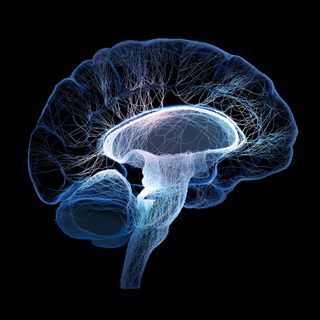Humans Sacrificed Brawn for Brains, Study Suggests

Humans may be smart because energy once devoted to brawn was given up for brains, researchers say.
The most powerful computer known is the brain. The human brain possesses about 100 billion neurons with about 1 quadrillion — 1 million billion — connections known as synapses wiring these cells together.
Humans possess more complex, powerful brains than humanity's closest living relatives, such as monkeys and apes. One reason behind this jump in brainpower may lie in how much of the human metabolism is devoted to the human brain — it consumes a whopping 20 percent of the body's total energy. [10 Surprising Facts About the Human Brain]
How the brain evolved
To gain insights into how the human brain evolved, scientists compared the metabolisms of humans and animals such as chimpanzees, mice and rhesus monkeys. They focused on how much energy each species devoted to the brain and body.
The researchers analyzed more than 10,000 compounds known as metabolites, which are small molecules formed by, or necessary to, metabolism, such as sugars and fats; the building blocks of proteins, DNA and cell membranes; and chemical signals given off by cells. They investigated metabolite levels in the kidney, thigh muscle and three brain regions — the primary visual cortex, which is involved in vision; the cerebellar cortex, which helps coordinate muscular activity; and the prefrontal cortex, which plays a major role in complex mental behavior, decision making and social behavior.
The investigators next compared how much the metabolisms of these animals differed with how far apart these species are evolutionarily. By analyzing human and other genomes, prior studies revealed when the ancestors of humans and other animals diverged. For instance, the ancestors of humans and rodents diverged about 75 million years ago, while divergence happened about 25 million years ago with the ancestors of rhesus monkeys and about 6 million years ago with the ancestors of chimpanzees.
Sign up for the Live Science daily newsletter now
Get the world’s most fascinating discoveries delivered straight to your inbox.
For the most part, the scientists found the levels of differences between the metabolisms of these species matched how far apart they were evolutionarily. (The further apart evolutionarily, the greater the metabolism differences were.) However, they discovered the rate of change in the metabolism of the human prefrontal cortex was about four times faster than that of chimpanzees. Even more surprisingly, the rate of change in the metabolism of human muscle was more than eight times faster that that of the chimpanzee.
"Even after so many years of research of humans and human evolution, we still can uncover large unknown differences between humans and other species," said study author Philipp Khaitovich, an evolutionary biologist at the Chinese Academy of Sciences' Key Laboratory of Computational Biology in Shanghai.
Humans vs. chimps
To rule out the possibility that these changes simply reflected the modern human couch potato lifestyle, the scientists performed additional experiments on rhesus monkeys, moving them from a spacious countryside facility to small indoor homes and serving them fatty and sugary food for several weeks, all to imitate the environment and behavior of contemporary humans. These lifestyle changes had only a small effect on the metabolisms of the monkeys' muscles.
"For a long time we were confused by metabolic changes in human muscle, until we realized that what other primates have in common, in contrast to humans, is their enormous muscle strength," said lead author Katarzyna Bozek, of the Chinese Academy of Sciences' Key Laboratory of Computational Biology in Shanghai. [The 7 Biggest Mysteries of the Human Body]
Chimps are far stronger than humans. Kevin Hunt, director of the Human Origins and Primate Evolution Lab at Indiana University, once told of watching an 85-pound (38.5 kilograms) female chimp in Africa snap branches off an ironwood tree with her fingertips, one that took Hunt two hands and all his strength to break.
To see just how much stronger chimps and rhesus monkeys are than humans, the researchers conducted muscle strength tests that involved pulling weights upward. All of the human volunteers in the experiment — who included professional athletes — were outcompeted by their primate opponents by more than twofold.
"According to our results, an average adult chimpanzee is approximately two to three times stronger than an average adult human," Khaitovich told Live Science.
The fact that metabolic changes in human muscle are paralleled by a drastic reduction in muscle strength leads the researchers to hint that human ancestors may have swapped brains for brawn.
"It is a very simple explanation, and it could be completely wrong," Khaitovich said. "In evolution, however, simple explanations often work well."
"Our work opens a door to further studies of human metabolic uniqueness," Khaitovich said. "It is a huge field that is virtually untouched by scientists."
The scientists detailed their findings online today (May 27) in the journal PLOS Biology.
Follow us @livescience, Facebook & Google+. Original article on Live Science.

Most Popular



